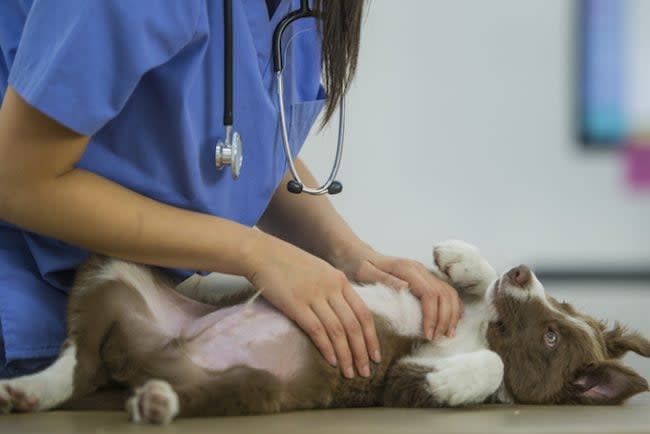Inflammation of the Abdomen Due to Bile Leakage in Dogs: Symptoms, Causes, Treatments


(Learn more about Inflammation of the abdomen due to bile leakage in dogs. Picture credit: Sebastian Condrea / Getty Images)
Inflammation of the abdomen due to bile leakage in dogs affects a dog’s abdomen. There is usually an underlying cause to the condition.
The condition is considered to be a serious one. Unfortunately, the condition can be life-threatening.
Technically, the condition is also known as bile peritonitis. You can also read more about peritonitis in general over here.
If you see the signs of the condition in your dog, then get to a veterinarian for a proper diagnosis and treatment.
Here’s what you should know about the symptoms, causes, and treatments for the condition.
Symptoms of Inflammation of the Abdomen Due to Bile Leakage in Dogs
The condition produces a wide range of symptoms. For instance, some of the most common symptoms include:
Pain in the abdomen
Swelling of the abdomen
Lack of energy
Skin turning yellow
Losing weight
Diarrhea
Loss of appetite
Vomiting
Causes of Inflammation of the Abdomen Due to Bile Leakage in Dogs

(Picture credit: FatCamera / Getty Images)
The cause of the condition is often an inflamed gall bladder. Usually, an infection or injury to the area causes this.
Additionally, the following factors can cause the condition:
Gallbladders
Gallbladder mucocele
Neoplastic tumors
Pancreatitis
Inflamed bile tract
Treatments for the Condition in Dogs
Firstly, your vet will ask about your dog’s symptoms. Secondly, your vet will ask about your dog’s complete medical history.
Thirdly, a full physical examination will be carried out. Blood and urine tests will also be taken. The subsequent results of the tests can show high liver enzymes.
Generally, X-rays and ultrasounds can help to confirm the condition. However, in some cases, a liver biopsy is also needed.
Treatment will depend on the underlying cause. But, generally, fluid therapy and antibiotics are used. As always, if your vet prescribes your dog any medicine, make sure to stick to the correct dose and frequency instructions. Also, complete the full course of medicine.
Unfortunately, severe cases of the condition will require a surgery. Usually, the recovery period will require fitting a feeding tube to your dog. This is to ensure that your dog receives their nutritional needs safely while recovering.
Have you ever cared for a dog who suffered from this condition? How did your vet help your dog recover? Let us know in the comments section below.
The post Inflammation of the Abdomen Due to Bile Leakage in Dogs: Symptoms, Causes, & Treatments appeared first on DogTime.

